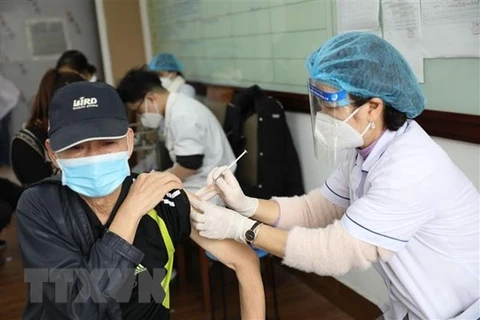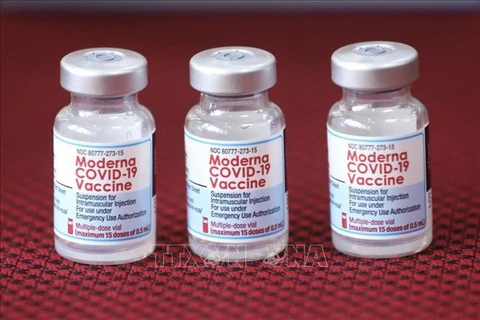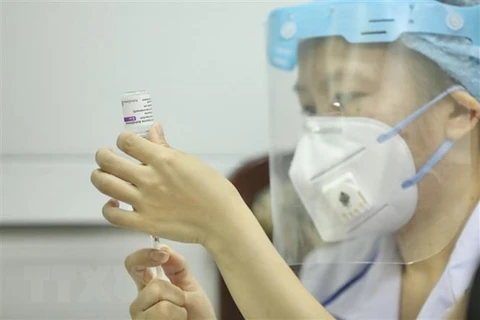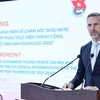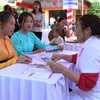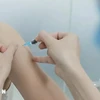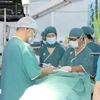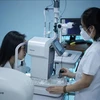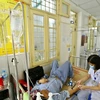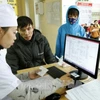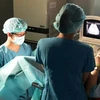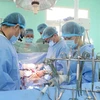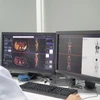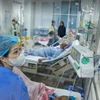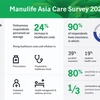 Health experts have said that children aged between 5-11 should get vaccinated against COVID-19. (Photo: vietnamnet.vn)
Health experts have said that children aged between 5-11 should get vaccinated against COVID-19. (Photo: vietnamnet.vn) In reply to parent concerns about the possibility of the vaccine impairing their child’s future fertility, Dr Tran Minh Dien, director of the Vietnam National Children’s Hospital, said COVID-19 vaccines have no side effects on the development of puberty or future fertility of children aged between 5 and 11.
Dien explained that the essence of this vaccine is that messenger RNA components, when entering the cell, create proteins and coordinate with some immune cells to produce antibodies.
The messenger RNAs do not enter the human genetic cell reservoir.
He added that the immediate side effects in children after getting COVID-19 vaccines would be the same as in adults, so there’s nothing to worry about.
Dien said parents should give their consent for their children to be vaccinated. The World Health Organization encourages countries to administer vaccinations to lower age groups when vaccines for children under five years old become available.
“This is a vulnerable group as children’s immune system is not yet complete while the new strain has remained unknown in the future,” he said.
Dr Nguyen Minh Tien, deputy director of HCM City’s Children’s Hospital, said the Omicron variant spread fast, especially among unvaccinated children.
Tien said parents should get their kids vaccinated as they will get immunity and be less likely to get infected or a severe disease.
Even though they had a normal health record, the hospital has received some severely-ill children who were not vaccinated. Moreover, he said that COVID-19 vaccines could help reduce post-COVID-19 syndrome in children.
According to research from the UK, the US and some European countries, between 6 and 15 per cent of children have symptoms of post-COVID-19 syndromes such as memory loss, forgetfulness, sleep disorders and depression.
It should be noted that multisystem inflammatory syndrome in children is common. This syndrome is very severe and requires hospitalisation. These syndromes rarely occur when children get vaccinated.
Regarding side effects after vaccination, Tien said parents need to monitor some common child reactions after injection, such as swelling and pain at the injection site, fatigue, muscle pain, joint pain, or fever.
He added that myocarditis did not appear in the age group of 5-11.
With a group of children with underlying diseases, Tien noted that the policy of the health sector is to give injections to children at medical facilities.
Parents must declare information about their children’s medical history to the school and medical facilities so that they will be vaccinated at the hospital.
Phan Trong Lan, director of the Ministry of Health’s Department of Preventive Medicine, said children aged 5-11 will have fewer and milder symptoms than adults if they are vaccinated.
Early vaccination not only helps protect children but also can help protect family members, including those who are not eligible for vaccination or can become seriously ill if infected, he said.
Dr Nguyen Thanh Hung, director of HCM City’s Children’s Hospital No 1, emphasised that vaccination against COVID-19 for children aged 5-11 was essential to creating a safe community.
“We have been in contact with many infected children who have recovered from the disease and still have many long-term psychophysiological problems,” he said, adding that the hospital still receives calls from parents asking about children getting COVID-19.
Dang Thanh Huyen, deputy head of the National Expanded Immunization Office, said that under the guidelines of the World Health Organization and the guidance of the Ministry of Health, asymptomatic COVID-19 cases can be vaccinated when the quarantine period is over.
“However, families can give their children time to recover from COVID-19 and have a good response to the vaccine,” she said.
According to Dien, getting COVID-19 is the natural introduction of the virus into the body and the body will react to create antibodies to fight the virus over a certain period of time.
"The longest time for storing antibodies against the virus is 6-9 months. Therefore, parents can wait for more than three months to get children who have recovered from COVID-19 vaccinated to supplement the antibody levels in their body,” he said.
Health experts said after vaccination, children need to stay at the vaccination site for at least 30 minutes to monitor, detect and promptly handle serious reactions.
Parents need to continuously monitor children’s health within 28 days after vaccination, especially the first 48 hours.
On March 28, Deputy Minister Nguyen Truong Son signed a document to request the departments of Health of the provinces and cities to coordinate with the departments of Education and Training to review and make a list of children from Grade 1 to 6 to get vaccinated.
Vietnam will start COVID-19 inoculations of children aged 5-11 years from the beginning of April, using 13.7 million doses of Pfizer and Moderna vaccines (for children from 6) donated by the Australian Government./.
VNA
